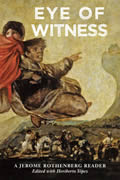
I have no hesitation in saying that Jerome Rothenberg is one of our greatest living poets and that his latest book,
Eye of Witness: A Jerome Rothenberg Reader, is among the top books published last year.
Eye of Witness, published by the relentlessly pioneering Black Widow Press, is a huge, 580-page tome that encompasses the entirety of Rothenberg's vast and many-hued career.
Rothenberg's terrain is the intersection of language and culture. He explores how the two mesh, in different times and places, to produce works redolent of both beauty and horror, pieces that can be prophetic or starkly pedestrian and coolly informative. It is in this meshing, this coming together, that his poetry is rooted.
A large part of the book is dedicated to his translations or versions (he calls them "variations") of the work both of great historical figures, such as Pablo Neruda and Tristan Tzara, and the mythic utterances of native and ethnic traditions arising, for example, out of Judaic or shamanistic experience. These pieces are in turn disturbing and challenging. They rise up before you, like a mighty golem of the imagination, and show you things that you'd never dreamt could be. In the end, what one receives in reading anything that Rothenberg has touched is a gift: wild, stormy, insidious, and completely new.
One of my favorite poems is Holocaust survivor Paul Celan's "Death Fugue." Rothenberg's version reads, in part:
Black milk of morning we drink you at dusktimewe drink you at noontime and dawntime we drink you at night
we drink and drink
There's a man in this house who cultivates snakes and who writes
who writes when it's nightfall nach Deutschland your golden hair
Margareta
he writes it and walks from the house and the stars all start flashing he
whistles his Jews to appear starts us scooping a grave out of sand
he commands us play up for the dance
And so on.
Rothenberg's own work, whether prose or poetry, is equally compelling. I'm intellectually and spiritually stimulated and excited by material such as these lines from the poem "The Sleep of Reason":
...All things that fly at nightfly past him.
Wings that brush an ear,
an ear concealed,
a memory beginning
in the house of sleep.
His is a world where owls
live in palm trees,
where a shadow in the sky
is like a magpie,
white & black are colors
only in the mind,
the cat you didn't murder
springs to life,
a whistle whirling in a cup,
gone & foregone,
a chasm bright with eyes.
There is a cave in Spain,
a fecal underworld,
where bats are swarming
among bulls,
the blackness ending in a wall
his hands rub up against,
a blind man in a painted world,
amok & monstrous
banging on a rock.
This stuff gets me at a level and in a place that very few other poets have ever reached — Celan, Trakl, some of the great surrealists, Vasko Popa, Simic's early and prose poems — but it's different, deeper. It shakes me, like a word-induced earthquake of the mind. A coworker showed me a book the other day and said, "This is my desert island book." I don't know if I could choose only one book, but if I could choose two or three, Rothenberg would definitely be included.
Many of Rothenberg's individual volumes were published by New Directions and bore titles such as Khurbn (the Yiddish and Hebrew term for the Holocaust), Poland/1931, A Seneca Journal, and That Dada Strain. He's also edited a number of anthologies, including A Big Jewish Book and Poems for the Millennium. Eye of Witness includes manifestos, artistic statements, interviews, and pieces on ethnopoetics, an approach to poetics that he pioneered, beginning in his 1968 anthology, Technicians of the Sacred. All of this material is rich, informative, and transformative, yet it's the poetry that I'll return to again and again. There's little like it in our impoverished world, and I'm proud and eager to celebrate and explore it while I can.